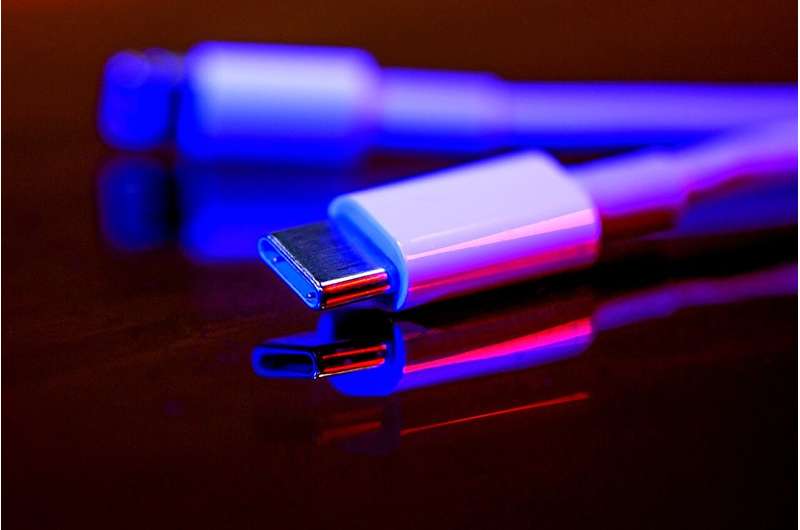This article has been reviewed according to Science X's editorial process and policies. Editors have highlighted the following attributes while ensuring the content's credibility:
fact-checked
trusted source
proofread
The USB-C charging port on the new iPhone 15 is a major win for consumers, expert says

First it was the MacBook in 2015. Then it was the iPad in 2018. Now, in 2023, the iPhone has finally caught up and has ditched Apple's proprietary Lightning port for USB-C.
During its annual September event, the Cupertino, California-based company announced the iPhone 15 and the iPhone 15 Pro alongside updates to its Apple Watch devices. In addition to offering upgraded processors, new cameras and refreshed designs, one of the standout features of the new phones was the inclusion of USB-C charging ports.
The company is largely believed to have made the move in response to legislation passed in the European Union last year requiring all mobile phones, tablets and cameras to have USB-C charging ports by 2024. Android phones and Windows-based laptops have relied on USB-C charges for years, and the iPhone has been one of the last major devices to not use the port up until this week.
Northeastern computer science and law professor Elettra Bietti said the new USB-C iPhones are a win for consumers. She sees the EU's directive as part of a broader push for more standardization among consumer technology products and for a greater transparency on the part of companies like Google, Apple and Microsoft.
"I see it going hand-in-hand with other efforts in Europe, like the Digital Markets Act, which are trying to render the tech industry more interoperable and unbundle different pieces of the tech ecosystem and pipeline to make consumers more empowered to move across different suppliers," she says.
The goal of the USB-C legislation is twofold. With a universal port across their devices, customers will no longer have to buy an array of different chargers. Additionally, the hope is that there will be a reduction in e-waste since customers will have to buy fewer chargers as a result.
"We all have at least three mobile phone chargers at home. Looking for the right charger, either at home or at work, can be quite annoying," Jozef Síkela, minister of Industry and Trade for the Czech Republic, said in a statement. "On top of this, these chargers amount to 11,000 tons of e-waste every year. Having a charger that fits multiple devices will save money and time and also helps us reduce electronic waste."
Those efforts aren't exclusive to Europe. Bietti notes that California has a bill going through the legislative process that would require devices like laptops and phones to be charged using USB-C by 2026.
That being said, she says Europe, as of late, has been ahead on regulating the technology industry.
"One key reason is that the European Commission and European institutions more broadly are less tied to the whims of specific governments and specific factions within member state parliaments," she says. "A lot of the EU's agenda is very policy driven. It's based on cross-party compromises that have to do with regulating certain industry segments and strategic sectors and much less on differences that are very local and based on local politics."
There are certainly bills in the United States going through the legislative process aimed at curtailing and regulating big tech. Bietti points to the American Innovation and Choice Online Act and the Open App Markets Act. The issue is they aren't getting the support they need.
"Those bills that aim at unbundling certain intermediary functions on the internet, at creating transparency, or creating interoperability, or allowing bills to opt in or out are not getting sufficient approval in Congress and are not being passed at the federal level," Bietti says.
There is some work being done at the state level, however, Bietti says. Just look at the California USB-C bill.
So it's generally agreed that the iPhone going to USB-C was the right move, but what are people to do with all their Lightning cables that will soon be obsolete? Won't getting rid of them cause e-waste?
Bietti says there will be some growing pains as consumers make the transition. But those cables would eventually become waste anyway when they stop working or when people upgrade their devices.
"There has been waste in the past without standardization," she says. "Standardization just leads to some devices becoming obsolete that would become obsolete anyway because people change their devices on a regular basis."




















